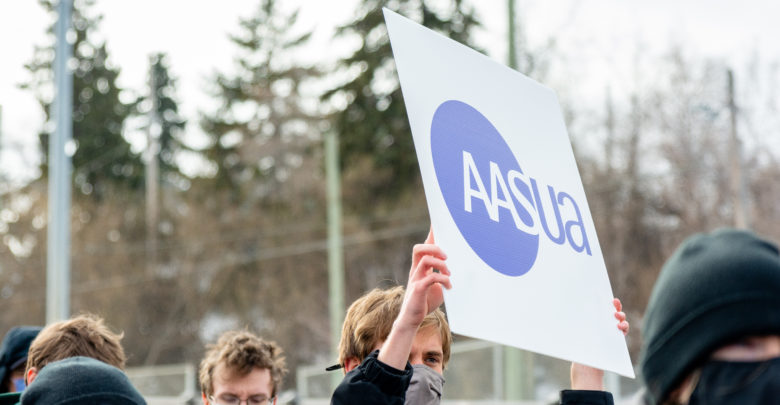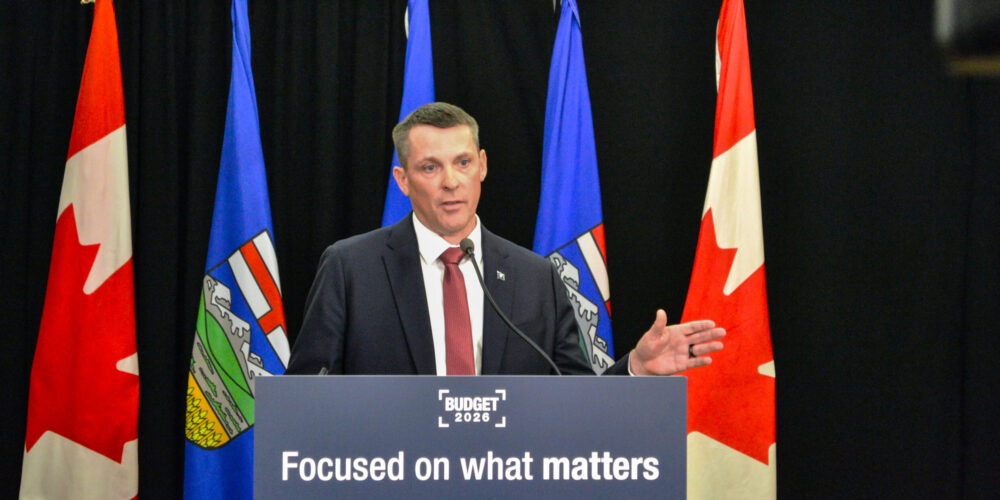AASUA remains “hopeful” amidst bargaining proposal rejections
"We still remain hopeful that we can reach a fair collective agreement at the table, and we will not have to resort to [a strike]," AASUA president says.
 Lochlann Kerr
Lochlann KerrThe Association of Academic Staff at the University of Alberta (AASUA) “still remain[s] hopeful” that a collective agreement with the U of A can be reached amidst proposal rejections, according to AASUA President Gordon Swaters.
AASUA and the U of A are in the process of negotiating a renewed collective agreement. This process is known as bargaining. The U of A received a bargaining notice from AASUA on January 17, 2024, and initial proposals were exchanged on March 5, 2024.
Conversations are currently revolving around AASUA’s initial monetary proposal of a 17 per cent salary increase for academic staff across-the-board. The U of A’s initial proposal was a two percent increase across-the-board in both the first and second year, and a 1.75 per cent increase in both the third and fourth year. Now, it’s proposing an increase for faculty of three per cent in the first and second years, then two per cent in the third and fourth years. All other constituency groups are offered a two per cent increase every year for four years.
According to a written statement from U of A Media Relations sent to The Gateway, the university “is encouraged by the progress made so far at the table. The university is seeking to reach a renewed collective agreement that considers the importance of the interests of our entire community” and “is hopeful that an agreement can be reached through negotiation as it always has.”
“The university is committed to bargaining in good faith, which means we also want to be respectful of ongoing conversations at the bargaining table that have not yet concluded,” the statement read.
“This university does not value frontline teaching,” Swaters says
AASUA’s proposal, which includes the 17 per cent salary increase across-the-board, cited that “since 2020–21, average faculty salaries at the U of A have been lower than all other U15 universities in Ontario and [British Columbia] (B.C.).”
Additionally, “since about 2016–2017, the U of A has consistently allocated a smaller fraction of its operating budget to academic salaries than other Alberta post-secondaries, with the gap between us widening over time,” the proposal stated.
According to a university update on February 4, the Canadian Association of University Business Officers confirmed that the data AASUA used “is known to have discrepancies.” The university stated that the data is “not … comparable between institutions in the way AASUA is using it.”
The university’s update also said AASUA’s proposed compensation increase would add “approximately $138 million or 12.5 per cent to operating expenses.”
“AASUA’s proposal would mean significant and untenable impacts to university services, teaching, and research that are still recovering from previous funding cuts,” the update read.
In an interview with The Gateway, Swaters said budgets are about priorities.
“This university does not value frontline teaching and research the way other universities of our stature prioritize it. This institution spends the lowest fraction of its operating budget on frontline teaching and research.”
University suggests AASUA’s ask for increased compensation is “unlawful,” AASUA refuses “nonsensical” questions
On January 23, AASUA’s lead negotiator, Cherie Klassen, received a letter from the university questioning AASUA’s monetary proposal.
The first question said that the Government of Alberta issued the university directives for this round of bargaining. It asked, “is it AASUA’s position that in this round of bargaining the university should ignore the bargaining directive of the province, a major funder of the university?”
The letter further cited the Public Sector Employers Act (PSEA). It asked if AASUA’s answer would change knowing that “bargaining directives from the provincial government have the legislative authority of the PSEA,” and that “it would be unlawful for the university to violate the PSEA.”
Klassen responded in a letter sent to the university on January 29. She said the university’s questions suggest that if AASUA were to insist on increased compensation, “AASUA’s actions would be unlawful or would be abetting the Employer to break the law, or both.”
“AASUA is not willing to engage with such nonsensical questions,” Klassen wrote. She further cited public sector employers that received government permission to amend initial proposals. According to Swaters, “the Employer’s questions to us represent a concerning misrepresentation of what the PSEA does.”
U of A rejects AASUA’s proposals and proposes new salary increases
AASUA met with the university’s bargaining team on February 6, where the university changed its initial proposal. Its current proposal is to increase faculty salaries by three per cent in the first and second years, then two per cent in the third and fourth years. All other constituency groups are offered a two per cent increase every year for four years.
“The Employer presented a deeply insulting response to our monetary proposal,” Swaters said. “Everybody in AASUA deserves fair compensation.”
Swaters said that AASUA is also “disappointed” that the university rejected AASUA’s proposal to remove the current two-tiered salary system for Academic Teaching Staff (ATS). Under this system, contract-based instructors hired after June 30, 2024, are likely to be paid less than contract-based instructors hired before June 30, 2024.
At the meeting, the university also rejected AASUA’s proposal to maintain its current academic benefits plan. Swaters said this would “almost certainly result in [AASUA] having to make deep and significant cuts to our benefit plan in just a year or two.”
Strike “is not imminent at all,” AASUA considering informal mediation
“We’re deeply disappointed and we’re considering our options at this point,” Swaters said. Regarding if students should expect a strike this semester, Swaters said AASUA is still “hopeful” about reaching an agreement.
“We still remain hopeful that we can reach a fair collective agreement at the table, and we will not have to resort to that outcome,” he said. “Job action is not imminent at all.”
Swaters added that AASUA is contemplating informal mediation. “If that fails, then the possibility exists for formal mediation.”
“[A strike] could happen down the road, but it’s not imminent. We’re working as hard as we can to try to get a deal that’s fair for our members and advances our cause to have our … most precariously employed people treated fairly.”
The next joint bargaining session between AASUA and the university is scheduled for February 27.




